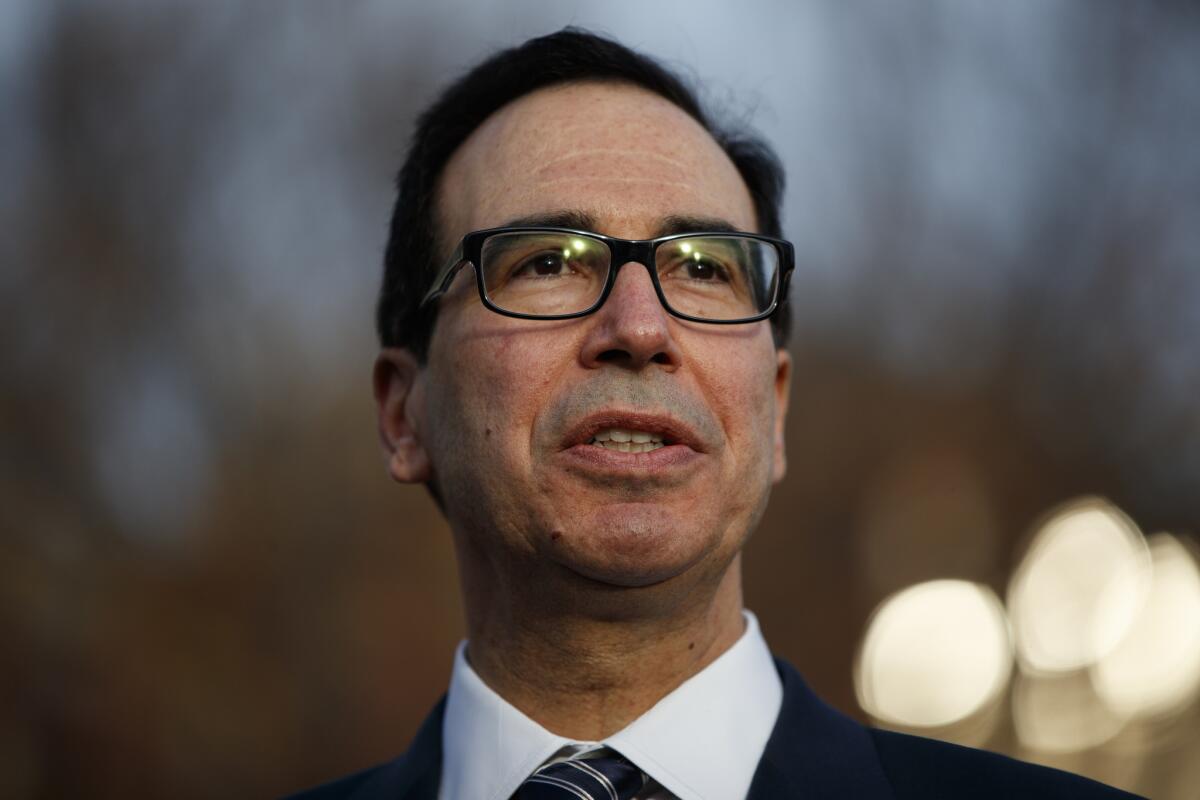Stocks drop after Mnuchin’s remarks on stimulus at Milken conference

- Share via
Stocks fell after Treasury Secretary Steven T. Mnuchin said that getting a stimulus deal done before the Nov. 3 election would be difficult.
Mnuchin, who spoke via a video feed at the Milken Institute Global Conference, said that he had an hourlong talk Wednesday morning with House Speaker Nancy Pelosi (D-San Francisco), and the two sides are negotiating — but time is running out.
“We continue to make progress on certain issues. On certain issues we continue to be far apart,” Mnuchin told Wall Street Journal Editor at Large Gerard Baker. “The clock will not stop. I’d say at this point getting something done before the election and executing on that would be difficult just given where we are and the level of details. But we are going to try to continue to work through these issues.”
Mnuchin gave a half-hour interview at the virtual conference that started at 11:30 a.m. Eastern time. Shortly after he made his remarks, the Standard & Poor’s 500 fell nearly 1%, from 3,509 points to 3,481, before closing at 3,488.67.
The benchmark index broke a strong four-day winning streak Monday, while the Dow Jones industrial average lost 165.81 points, or 0.6%, to 28,514. The pullback knocked the Dow back into the red for the year. The Nasdaq composite slid 95.17 points, or 0.8%, to 11,768.73. At one point it had been up 0.6%.
Small company stocks, the biggest gainers so far this month, also fell. The Russell 2000 small-cap index gave up 15.20 points, or 0.9%, to 1,621.65.
Despite the market’s two-day slide, stocks have been mostly pushing higher this month. About halfway through October, the major stock indexes have recouped most of their losses from last month’s market swoon.
Even so, this week’s kickoff to earnings reporting season is painting a mixed picture for investors.
Big banks are traditionally the first companies to tell investors how much profit they made in the prior quarter, and Bank of America and Wells Fargo fell after the release of their reports, posting the biggest losses in the S&P 500. Bank of America sank 5.3% after its revenue fell short of analysts’ forecast, while Wells Fargo dropped 6% after its earnings were lower than Wall Street expected.
Goldman Sachs rose 0.2% after reporting stronger profit than analysts expected. U.S. Bancorp fell 0.4% after giving up an early gain following its earnings report, which was also stronger than analysts expected.
Across the S&P 500, analysts are expecting companies to report another drop in profits for the summer from year-earlier levels. But they’re forecasting the decline to moderate from the nearly 32% plunge from the spring as the economy has shown signs of improvement.
The sharpest profit drops for the quarter are expected to come from energy stocks, but the sector rose Wednesday to some of the biggest gains among the 11 that make up the S&P 500 index. A 2.1% rise for crude oil prices helped. So did a report that ConocoPhillips is in talks to buy Concho Resources. Concho jumped 10.2%, the biggest gainer in the S&P 500, after the report from Bloomberg News.
Tech stocks fell, weighing down the broader S&P 500. Amazon fell 2.3% and Microsoft slid 0.9%. Apple bounced back from an early slide and eked out a 0.1% gain.
Because of their massive size, the movements of Big Tech stocks have an outsized effect on the S&P 500 and other indexes.
The yield on the 10-year Treasury note fell to 0.72% from 0.74% late Tuesday despite a report showing that inflation at the wholesale level strengthened more than economists expected last month.
Prices for producers rose 0.4% last month from August, double economists’ expectations. But even though inflation firmed, economists say it’s still subdued amid a weakened economy.
The Federal Reserve has also indicated that it will keep interest rates at nearly zero for a while to support the economy, even if inflation hits its target level.
European and Asian markets ended mixed.
Times staff writer Laurence Darmiento contributed to this report.
More to Read
Inside the business of entertainment
The Wide Shot brings you news, analysis and insights on everything from streaming wars to production — and what it all means for the future.
You may occasionally receive promotional content from the Los Angeles Times.










